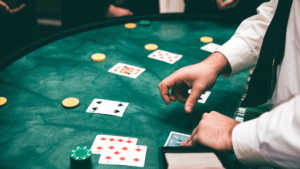Gambling addiction is a complex psychological phenomenon that affects millions around the world. Individuals may start gambling for entertainment, but the allure of winning can quickly lead to compulsive behavior. The psychological mechanisms driving gambling addiction often stem from the interplay of excitement, reward systems in the brain, and a desire to escape from reality.
At the core of gambling addiction lies the concept of reinforcement. When a person wins, their brain releases dopamine, creating a pleasurable sensation that reinforces the behavior. This reward cycle can lead to an inability to stop gambling despite negative consequences, as the anticipation of winning overshadows the reality of loss.
Understanding these psychological components is crucial for both individuals and their loved ones. Recognizing the signs of addiction can pave the way for seeking help and finding healthier coping mechanisms. By exploring the underlying factors of gambling addiction, readers can gain valuable insights into how it manifests and affects those involved.
Understanding Gambling Addiction
Gambling addiction is a complex psychological condition characterized by compulsive gambling behavior. It encompasses various disorders and behavioral patterns that can have significant impacts on an individual’s life.
Defining Gambling Addiction
Gambling addiction, often referred to as problematic gambling or pathological gambling, is recognized as a behavioral addiction. Individuals with this condition exhibit a persistent urge to gamble, despite experiencing negative consequences. Symptoms include loss of control, preoccupation with gambling, and chasing losses. The American Psychiatric Association recognizes gambling disorder in the Diagnostic and Statistical Manual of Mental Disorders (DSM-5), outlining criteria for diagnosis.
Types of Gambling Disorders
Gambling addiction can manifest in different forms, impacting individuals variously. The main categories include:
- Problem Gambling: Involves harmful gambling behavior affecting personal and social aspects of life.
- Pathological Gambling: A more severe form, classified as a mental health disorder, characterized by an inability to stop gambling despite harmful effects.
- Compulsive Gambling: A frequent term that describes the uncontrollable urge to continue gambling, even when facing significant losses.
Each type requires tailored approaches in treatment and intervention.
Gambling Behavior and Patterns
Gambling behavior can be categorized based on frequency, intensity, and financial impact. Key patterns include:
- Chasing Losses: Continually gambling to recover lost money, often leading to greater financial losses.
- Risky Betting: Engaging in high-stakes gambling activities that increase the potential for harm.
- Isolation: Many problem gamblers withdraw from social networks to hide their gambling habits.
Understanding these patterns is crucial for identifying at-risk individuals and developing effective treatment strategies.
The Psychology Behind Gambling Addiction
Gambling addiction arises from a complex interplay of brain chemistry and psychological mechanisms. Understanding these elements sheds light on why some individuals become compulsive gamblers, while others can gamble responsibly.
Brain Chemistry and the Reward System
The brain’s reward system plays a crucial role in gambling addiction. When an individual engages in gambling, the brain releases neurotransmitters, notably dopamine. This release creates feelings of pleasure and satisfaction. Over time, repeated gambling reinforces these sensations, establishing a strong connection between the act of gambling and the reward received.
When a gambler wins, even a small amount, the brain registers this as a significant victory, often overshadowing losses. As this cycle repeats, the brain learns to associate gambling with positive reinforcement, driving the individual to continue seeking these rewarding experiences, often despite negative consequences.
Psychological Mechanisms and Reinforcement
Psychological factors significantly contribute to gambling addiction. One key mechanism is variable reinforcement, where the outcome of a gamble is unpredictable. This uncertainty can heighten excitement and compel individuals to keep returning, due to the anticipation of a win. Even losing streaks can reinforce the behavior, as the hope of a future win stimulates continued play.
Another psychological aspect is the presence of cognitive distortions, such as the illusion of control. Gamblers may believe they can influence outcomes through their decisions, leading to a false sense of mastery over chance. This creates a cycle of compulsive behavior where individuals continue to gamble in pursuit of imagined control and success.
Role of Dopamine in Gambling
Dopamine is integral to the psychology of gambling. It functions as the brain’s “feel-good” neurotransmitter. When a gambler wins, dopamine levels spike, enhancing pleasure and reinforcing the behavior. This release encourages repeat gambling as individuals chase that euphoric feeling.
Moreover, research indicates that problem gamblers may have altered dopamine responses compared to non-addicted individuals. They might experience diminished pleasure from typical daily activities, leading them to seek gamified experiences as an alternative. This contrast further entrenches their gambling habits, as they rely on high-stakes situations to feel a sense of reward.
Impulsivity and Illusion of Control
Impulsivity often characterizes those struggling with gambling addiction. This trait can lead to poor decision-making, as individuals act on immediate desires rather than considering long-term consequences. Impulsive behaviors contribute to escalating gambling habits, making it difficult for individuals to recognize when they are overstepping limits.
The illusion of control accentuates this impulsiveness. Many gamblers convince themselves they can outsmart the odds or execute particular strategies that alter the outcome, despite overwhelming evidence that gambling is inherently random. This belief fosters continued engagement and drives them deeper into addiction, as they remain hopeful that their skills will prevail, even when they frequently lose.
Consequences and Contributing Factors
Gambling addiction has several emotional, social, and environmental consequences that significantly affect individuals and their relationships. These factors intertwine, leading to mental health issues and worsening an individual’s situation.
Emotional and Mental Health Impacts
Gambling addiction can lead to severe emotional distress. Many individuals experience increased levels of anxiety and depression due to constant financial strain and feelings of failure. The cycle of winning and losing creates an emotional rollercoaster, where initial wins may foster a false sense of control and invincibility.
As losses accumulate, feelings of guilt and shame often emerge. This emotional burden can result in isolation as individuals withdraw from social interactions. They may neglect responsibilities, further exacerbating their mental health conditions. The continuous impairments to their self-worth and confidence can lead to long-lasting psychological issues.
Chasing Losses and Negative Consequences
The urge to recover lost money often drives individuals to chase their losses, leading to more significant financial problems. This behavior creates a cycle of increased gambling, where the hope of winning again overshadows the reality of losses.
Chasing losses can lead to catastrophic consequences, including massive debt and potential bankruptcy. Many individuals feel compelled to gamble more despite knowing the odds are against them, resulting in a vicious cycle of desperation and impulsive behavior. This behavior intensifies the gambling problem, making it harder to break free from the cycle.
Environmental and Social Influences
Environmental factors play a crucial role in gambling addiction. Accessibility to gambling venues, online gaming, and cultural attitudes towards gambling can influence the likelihood of developing a gambling problem.
Social environments also significantly affect gambling behavior. Individuals surrounded by peers who gamble may feel pressured to participate, normalizing the act. Such contexts can lead to increased substance use as individuals seek ways to cope with their gambling habits. Relationships often suffer as the addiction escalates, causing rifts and estrangement between loved ones. These combined influences create a complex web, aiding the persistence of gambling addiction.
Pathways to Recovery and Support
Recovery from gambling addiction requires a structured approach with a focus on seeking help, therapeutic methods, and robust support systems. Establishing a strong foundation in these areas can facilitate meaningful change and long-term sobriety.
Seeking Help and Early Intervention
Recognizing the need for help is often the first step toward recovery. Early intervention can significantly improve outcomes for individuals struggling with gambling addiction.
Professionals recommend various strategies:
- Hotlines: Access to immediate support from trained counselors.
- Assessment: Professional evaluations to gauge the severity of the addiction.
- Education: Informing individuals and families about gambling addiction.
Actively seeking help encourages individuals to acknowledge their challenges. This process fosters a supportive environment, crucial for initiating recovery.
Therapeutic Approaches and CBT
Cognitive Behavioral Therapy (CBT) is a widely recognized technique for treating gambling addiction. CBT focuses on changing negative thought patterns that contribute to problematic gambling behaviors.
Key components of CBT include:
- Identifying Triggers: Understanding specific situations or emotions that lead to gambling.
- Developing Coping Strategies: Learning healthier responses to urges.
- Goal Setting: Establishing clear, achievable objectives to encourage accountability.
Therapists may also integrate mindfulness techniques. These practices help clients develop better emotional regulation and reduce impulsivity.
Support Systems and Gamblers Anonymous
Support systems play a vital role in recovery. Gamblers Anonymous (GA) offers a community-based approach, providing a safe space for individuals to share experiences and support one another.
Key features of GA include:
- Regular Meetings: Encourage regular attendance to maintain accountability.
- 12-Step Program: A structured method focusing on personal responsibility and mutual support.
- Peer Support: Building relationships with others who understand the challenges of gambling addiction.
Utilizing support networks enhances resilience and fosters a sense of belonging, both of which are essential for sustained recovery.


